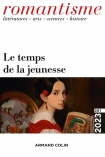
Romantisme N°200 (2/2023)
Pour acheter ce numéro, contactez-nous
Recevez les numéros de l'année en cours et accédez à l'intégralité des articles en ligne.
Cet article s’intéresse aux stratégies de quelques chansonniers professionnels et militants à la Belle Époque : Jules Jouy (1855-1897), Maurice Boukay (1866-1931), Gaston Couté (1880- 1914) et Montéhus (1872-1952). Ceux-ci sont amenés à diversifier leur production pour vivre de leur métier et composer avec la censure, en écrivant de manière différenciée en fonction des lieux et modes de diffusion de leurs chansons (cabaret, café-concert, presse). Les collaborations avec les journaux sont essentielles dans l’élaboration du genre de la chanson du jour, publiée quotidiennement dans un journal. Au tournant du siècle, le succès de la chanson sociale permet à des auteurs-interprètes comme Couté ou Montéhus de faire carrière dans le genre avec des textes fortement engagés. La carrière de Montéhus, « chansonnier humanitaire », est en particulier marquée par le clivage politique entre dreyfusards et antidreyfusards, et par sa collaboration avec l’hebdomadaire révolutionnaire La Guerre sociale, ce qui aboutit à la construction d’une image médiatique de chansonnier social ou engagé.
This paper focuses on the strategies of a number of professional and activist singers from the Belle Époque: Jules Jouy (1855-1897), Maurice Boukay (1866-1931), Gaston Couté (1880-1914) and Montéhus (1872-1952). They found themselves diversifying their production in order to make a living out of their activity and to take censorship into account, by writing in different ways according to the venues and modes of circulation of their songs (cabaret, cafés, the press). Collaborations with newspapers are essential to the development of the genre of the “song of the day”, published daily in a newspaper. At the turn of the century, the success if the social song enabled singer-writers such as Couté or Montéhus to build careers in the genre with very activist texts. Montéhus’ career in particular, that of a “humanitarian songwriter”, is marked by the political divide between pro and anti Dreyfus supporters, and by his collaboration with the revolutionary weekly La Guerre sociale, which led to his construction of a media image as social or activist songwriter.

